Capital Punishment: Examining Ethical, Legal, and Social Implications
VerifiedAdded on 2020/10/07
|7
|2179
|41
Essay
AI Summary
This essay delves into the contentious issue of capital punishment, exploring the ethical, legal, and moral arguments for and against it. The author examines various perspectives, including those of governments, philosophers, international organizations, and activists. The essay defines the death penalty, discusses its historical context, and highlights its use in different countries, including the United States. It presents arguments against capital punishment, emphasizing its cruelty, inhumanity, and violation of human rights. The essay also explores the discriminatory nature of the death penalty, citing statistics on racial disparities and the impact on the poor and mentally ill. Furthermore, it addresses arguments in favor of capital punishment, such as the idea of just retribution and the need to protect society from dangerous criminals. The author concludes by reiterating the view that the death penalty is a form of cruel and unusual punishment that should be opposed, regardless of the circumstances.
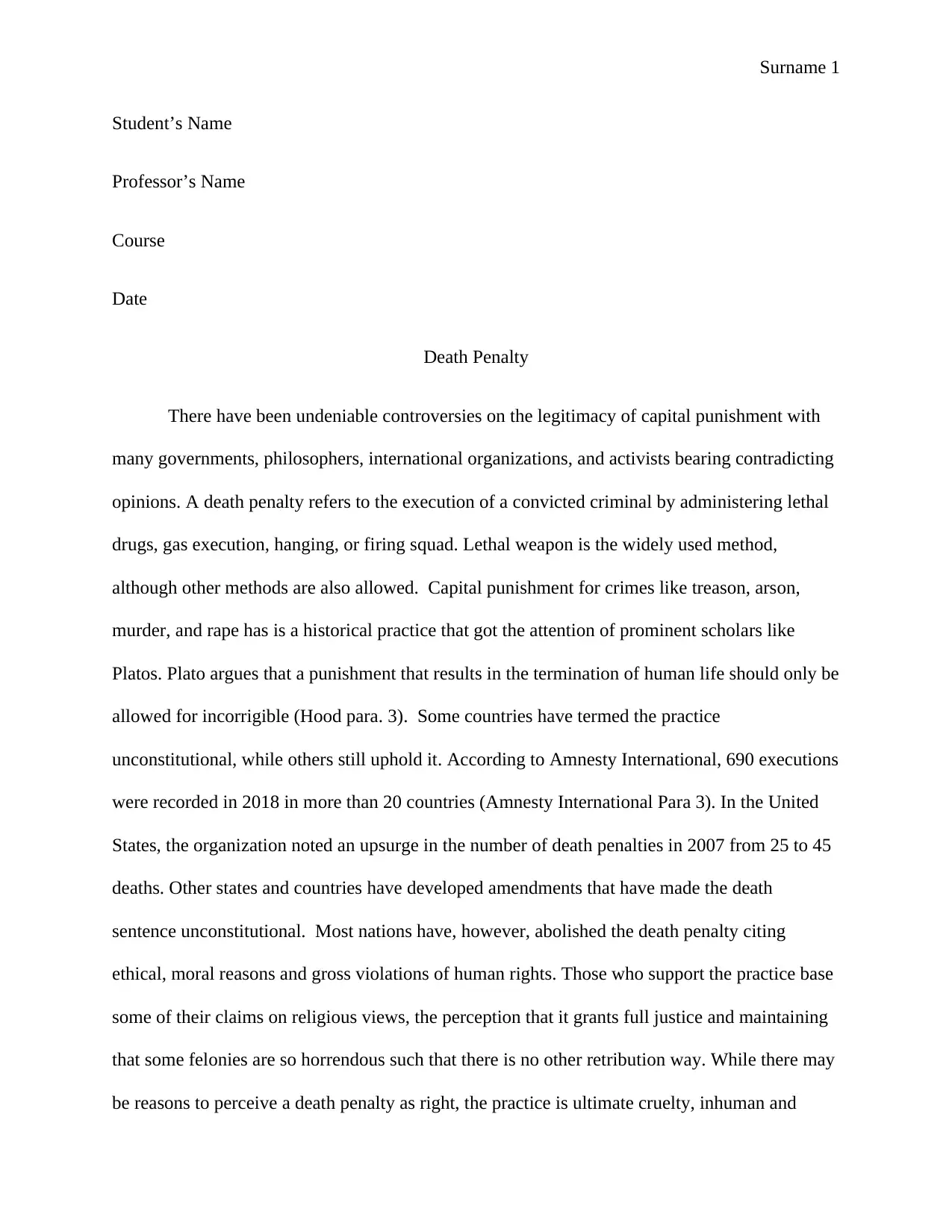
Surname 1
Student’s Name
Professor’s Name
Course
Date
Death Penalty
There have been undeniable controversies on the legitimacy of capital punishment with
many governments, philosophers, international organizations, and activists bearing contradicting
opinions. A death penalty refers to the execution of a convicted criminal by administering lethal
drugs, gas execution, hanging, or firing squad. Lethal weapon is the widely used method,
although other methods are also allowed. Capital punishment for crimes like treason, arson,
murder, and rape has is a historical practice that got the attention of prominent scholars like
Platos. Plato argues that a punishment that results in the termination of human life should only be
allowed for incorrigible (Hood para. 3). Some countries have termed the practice
unconstitutional, while others still uphold it. According to Amnesty International, 690 executions
were recorded in 2018 in more than 20 countries (Amnesty International Para 3). In the United
States, the organization noted an upsurge in the number of death penalties in 2007 from 25 to 45
deaths. Other states and countries have developed amendments that have made the death
sentence unconstitutional. Most nations have, however, abolished the death penalty citing
ethical, moral reasons and gross violations of human rights. Those who support the practice base
some of their claims on religious views, the perception that it grants full justice and maintaining
that some felonies are so horrendous such that there is no other retribution way. While there may
be reasons to perceive a death penalty as right, the practice is ultimate cruelty, inhuman and
Student’s Name
Professor’s Name
Course
Date
Death Penalty
There have been undeniable controversies on the legitimacy of capital punishment with
many governments, philosophers, international organizations, and activists bearing contradicting
opinions. A death penalty refers to the execution of a convicted criminal by administering lethal
drugs, gas execution, hanging, or firing squad. Lethal weapon is the widely used method,
although other methods are also allowed. Capital punishment for crimes like treason, arson,
murder, and rape has is a historical practice that got the attention of prominent scholars like
Platos. Plato argues that a punishment that results in the termination of human life should only be
allowed for incorrigible (Hood para. 3). Some countries have termed the practice
unconstitutional, while others still uphold it. According to Amnesty International, 690 executions
were recorded in 2018 in more than 20 countries (Amnesty International Para 3). In the United
States, the organization noted an upsurge in the number of death penalties in 2007 from 25 to 45
deaths. Other states and countries have developed amendments that have made the death
sentence unconstitutional. Most nations have, however, abolished the death penalty citing
ethical, moral reasons and gross violations of human rights. Those who support the practice base
some of their claims on religious views, the perception that it grants full justice and maintaining
that some felonies are so horrendous such that there is no other retribution way. While there may
be reasons to perceive a death penalty as right, the practice is ultimate cruelty, inhuman and
Paraphrase This Document
Need a fresh take? Get an instant paraphrase of this document with our AI Paraphraser
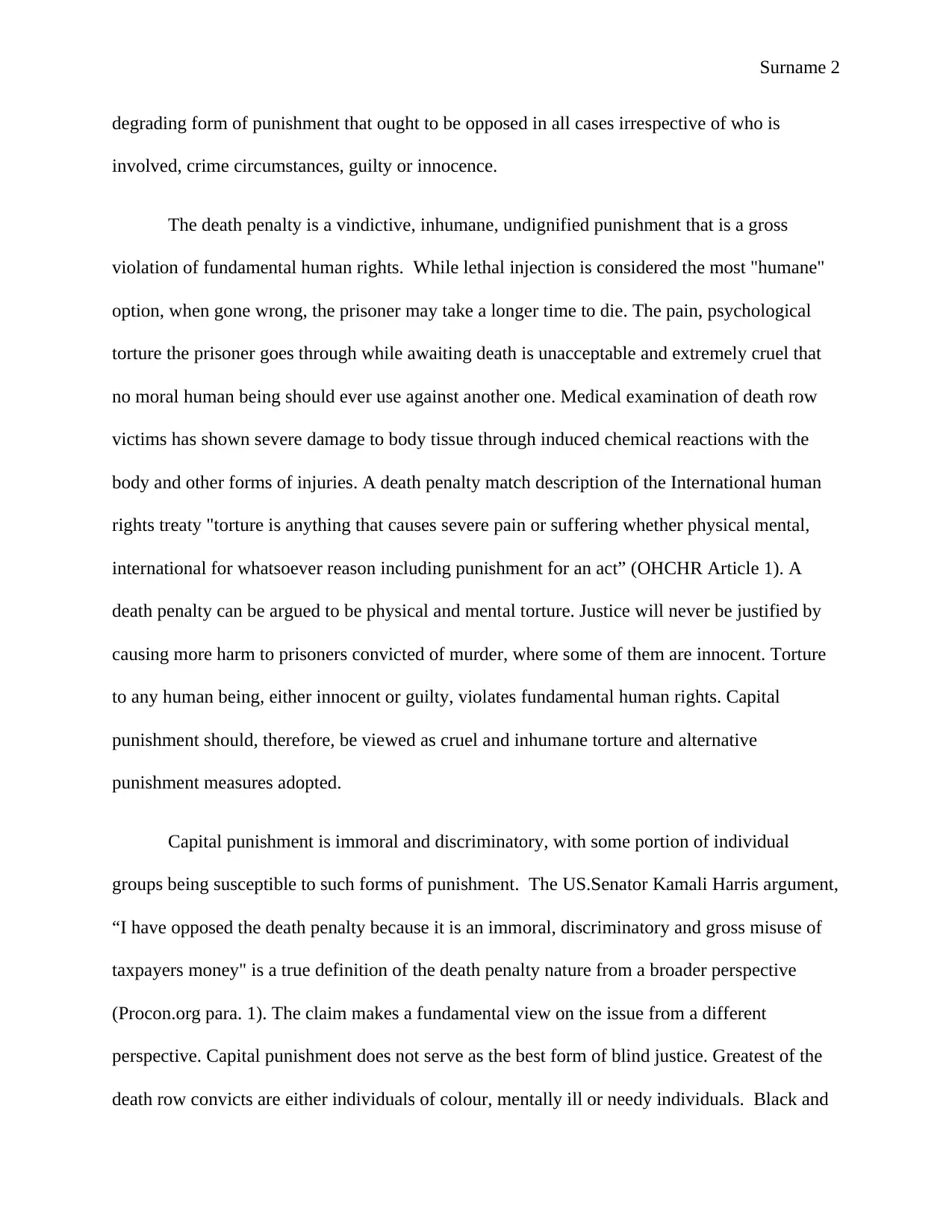
Surname 2
degrading form of punishment that ought to be opposed in all cases irrespective of who is
involved, crime circumstances, guilty or innocence.
The death penalty is a vindictive, inhumane, undignified punishment that is a gross
violation of fundamental human rights. While lethal injection is considered the most "humane"
option, when gone wrong, the prisoner may take a longer time to die. The pain, psychological
torture the prisoner goes through while awaiting death is unacceptable and extremely cruel that
no moral human being should ever use against another one. Medical examination of death row
victims has shown severe damage to body tissue through induced chemical reactions with the
body and other forms of injuries. A death penalty match description of the International human
rights treaty "torture is anything that causes severe pain or suffering whether physical mental,
international for whatsoever reason including punishment for an act” (OHCHR Article 1). A
death penalty can be argued to be physical and mental torture. Justice will never be justified by
causing more harm to prisoners convicted of murder, where some of them are innocent. Torture
to any human being, either innocent or guilty, violates fundamental human rights. Capital
punishment should, therefore, be viewed as cruel and inhumane torture and alternative
punishment measures adopted.
Capital punishment is immoral and discriminatory, with some portion of individual
groups being susceptible to such forms of punishment. The US.Senator Kamali Harris argument,
“I have opposed the death penalty because it is an immoral, discriminatory and gross misuse of
taxpayers money" is a true definition of the death penalty nature from a broader perspective
(Procon.org para. 1). The claim makes a fundamental view on the issue from a different
perspective. Capital punishment does not serve as the best form of blind justice. Greatest of the
death row convicts are either individuals of colour, mentally ill or needy individuals. Black and
degrading form of punishment that ought to be opposed in all cases irrespective of who is
involved, crime circumstances, guilty or innocence.
The death penalty is a vindictive, inhumane, undignified punishment that is a gross
violation of fundamental human rights. While lethal injection is considered the most "humane"
option, when gone wrong, the prisoner may take a longer time to die. The pain, psychological
torture the prisoner goes through while awaiting death is unacceptable and extremely cruel that
no moral human being should ever use against another one. Medical examination of death row
victims has shown severe damage to body tissue through induced chemical reactions with the
body and other forms of injuries. A death penalty match description of the International human
rights treaty "torture is anything that causes severe pain or suffering whether physical mental,
international for whatsoever reason including punishment for an act” (OHCHR Article 1). A
death penalty can be argued to be physical and mental torture. Justice will never be justified by
causing more harm to prisoners convicted of murder, where some of them are innocent. Torture
to any human being, either innocent or guilty, violates fundamental human rights. Capital
punishment should, therefore, be viewed as cruel and inhumane torture and alternative
punishment measures adopted.
Capital punishment is immoral and discriminatory, with some portion of individual
groups being susceptible to such forms of punishment. The US.Senator Kamali Harris argument,
“I have opposed the death penalty because it is an immoral, discriminatory and gross misuse of
taxpayers money" is a true definition of the death penalty nature from a broader perspective
(Procon.org para. 1). The claim makes a fundamental view on the issue from a different
perspective. Capital punishment does not serve as the best form of blind justice. Greatest of the
death row convicts are either individuals of colour, mentally ill or needy individuals. Black and
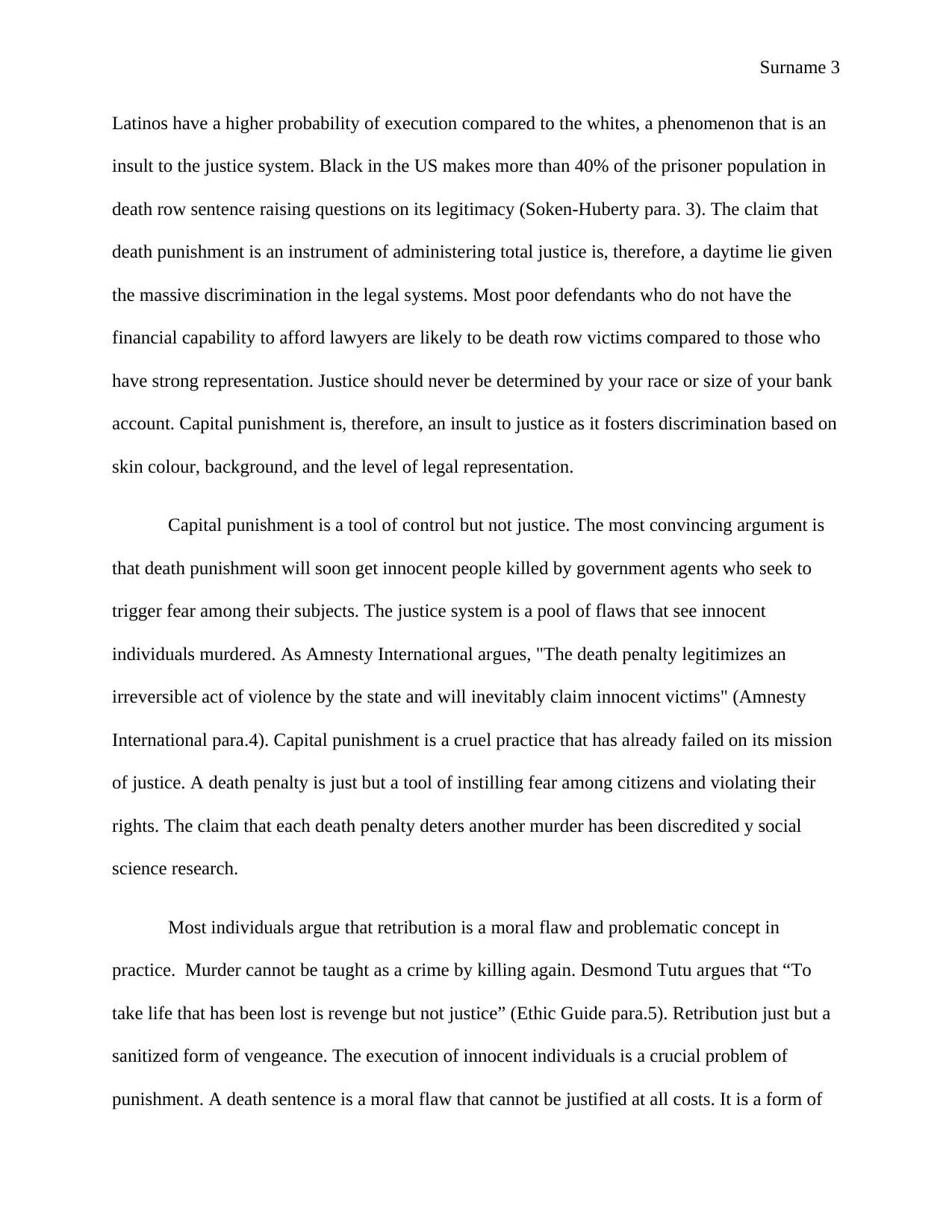
Surname 3
Latinos have a higher probability of execution compared to the whites, a phenomenon that is an
insult to the justice system. Black in the US makes more than 40% of the prisoner population in
death row sentence raising questions on its legitimacy (Soken-Huberty para. 3). The claim that
death punishment is an instrument of administering total justice is, therefore, a daytime lie given
the massive discrimination in the legal systems. Most poor defendants who do not have the
financial capability to afford lawyers are likely to be death row victims compared to those who
have strong representation. Justice should never be determined by your race or size of your bank
account. Capital punishment is, therefore, an insult to justice as it fosters discrimination based on
skin colour, background, and the level of legal representation.
Capital punishment is a tool of control but not justice. The most convincing argument is
that death punishment will soon get innocent people killed by government agents who seek to
trigger fear among their subjects. The justice system is a pool of flaws that see innocent
individuals murdered. As Amnesty International argues, "The death penalty legitimizes an
irreversible act of violence by the state and will inevitably claim innocent victims" (Amnesty
International para.4). Capital punishment is a cruel practice that has already failed on its mission
of justice. A death penalty is just but a tool of instilling fear among citizens and violating their
rights. The claim that each death penalty deters another murder has been discredited y social
science research.
Most individuals argue that retribution is a moral flaw and problematic concept in
practice. Murder cannot be taught as a crime by killing again. Desmond Tutu argues that “To
take life that has been lost is revenge but not justice” (Ethic Guide para.5). Retribution just but a
sanitized form of vengeance. The execution of innocent individuals is a crucial problem of
punishment. A death sentence is a moral flaw that cannot be justified at all costs. It is a form of
Latinos have a higher probability of execution compared to the whites, a phenomenon that is an
insult to the justice system. Black in the US makes more than 40% of the prisoner population in
death row sentence raising questions on its legitimacy (Soken-Huberty para. 3). The claim that
death punishment is an instrument of administering total justice is, therefore, a daytime lie given
the massive discrimination in the legal systems. Most poor defendants who do not have the
financial capability to afford lawyers are likely to be death row victims compared to those who
have strong representation. Justice should never be determined by your race or size of your bank
account. Capital punishment is, therefore, an insult to justice as it fosters discrimination based on
skin colour, background, and the level of legal representation.
Capital punishment is a tool of control but not justice. The most convincing argument is
that death punishment will soon get innocent people killed by government agents who seek to
trigger fear among their subjects. The justice system is a pool of flaws that see innocent
individuals murdered. As Amnesty International argues, "The death penalty legitimizes an
irreversible act of violence by the state and will inevitably claim innocent victims" (Amnesty
International para.4). Capital punishment is a cruel practice that has already failed on its mission
of justice. A death penalty is just but a tool of instilling fear among citizens and violating their
rights. The claim that each death penalty deters another murder has been discredited y social
science research.
Most individuals argue that retribution is a moral flaw and problematic concept in
practice. Murder cannot be taught as a crime by killing again. Desmond Tutu argues that “To
take life that has been lost is revenge but not justice” (Ethic Guide para.5). Retribution just but a
sanitized form of vengeance. The execution of innocent individuals is a crucial problem of
punishment. A death sentence is a moral flaw that cannot be justified at all costs. It is a form of
⊘ This is a preview!⊘
Do you want full access?
Subscribe today to unlock all pages.

Trusted by 1+ million students worldwide
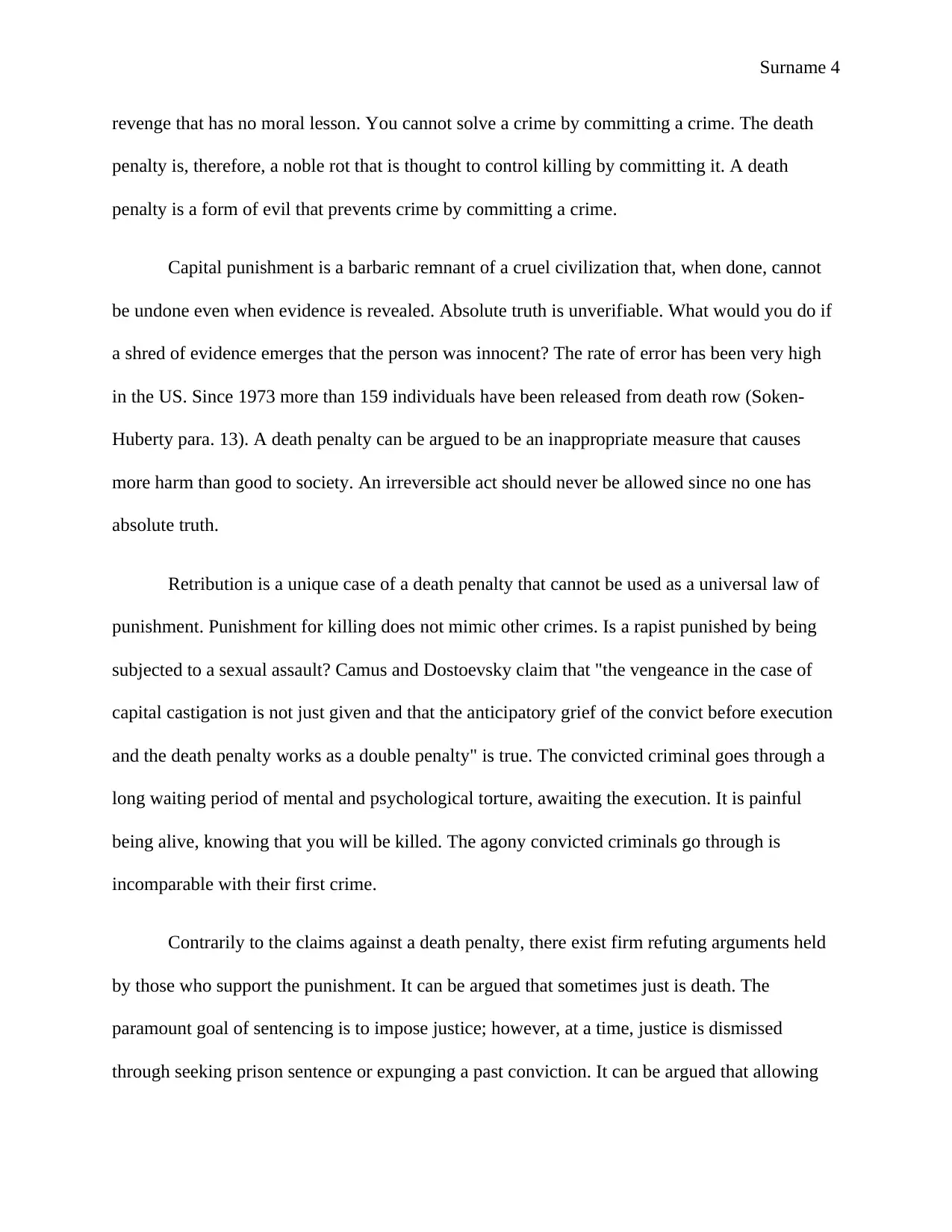
Surname 4
revenge that has no moral lesson. You cannot solve a crime by committing a crime. The death
penalty is, therefore, a noble rot that is thought to control killing by committing it. A death
penalty is a form of evil that prevents crime by committing a crime.
Capital punishment is a barbaric remnant of a cruel civilization that, when done, cannot
be undone even when evidence is revealed. Absolute truth is unverifiable. What would you do if
a shred of evidence emerges that the person was innocent? The rate of error has been very high
in the US. Since 1973 more than 159 individuals have been released from death row (Soken-
Huberty para. 13). A death penalty can be argued to be an inappropriate measure that causes
more harm than good to society. An irreversible act should never be allowed since no one has
absolute truth.
Retribution is a unique case of a death penalty that cannot be used as a universal law of
punishment. Punishment for killing does not mimic other crimes. Is a rapist punished by being
subjected to a sexual assault? Camus and Dostoevsky claim that "the vengeance in the case of
capital castigation is not just given and that the anticipatory grief of the convict before execution
and the death penalty works as a double penalty" is true. The convicted criminal goes through a
long waiting period of mental and psychological torture, awaiting the execution. It is painful
being alive, knowing that you will be killed. The agony convicted criminals go through is
incomparable with their first crime.
Contrarily to the claims against a death penalty, there exist firm refuting arguments held
by those who support the punishment. It can be argued that sometimes just is death. The
paramount goal of sentencing is to impose justice; however, at a time, justice is dismissed
through seeking prison sentence or expunging a past conviction. It can be argued that allowing
revenge that has no moral lesson. You cannot solve a crime by committing a crime. The death
penalty is, therefore, a noble rot that is thought to control killing by committing it. A death
penalty is a form of evil that prevents crime by committing a crime.
Capital punishment is a barbaric remnant of a cruel civilization that, when done, cannot
be undone even when evidence is revealed. Absolute truth is unverifiable. What would you do if
a shred of evidence emerges that the person was innocent? The rate of error has been very high
in the US. Since 1973 more than 159 individuals have been released from death row (Soken-
Huberty para. 13). A death penalty can be argued to be an inappropriate measure that causes
more harm than good to society. An irreversible act should never be allowed since no one has
absolute truth.
Retribution is a unique case of a death penalty that cannot be used as a universal law of
punishment. Punishment for killing does not mimic other crimes. Is a rapist punished by being
subjected to a sexual assault? Camus and Dostoevsky claim that "the vengeance in the case of
capital castigation is not just given and that the anticipatory grief of the convict before execution
and the death penalty works as a double penalty" is true. The convicted criminal goes through a
long waiting period of mental and psychological torture, awaiting the execution. It is painful
being alive, knowing that you will be killed. The agony convicted criminals go through is
incomparable with their first crime.
Contrarily to the claims against a death penalty, there exist firm refuting arguments held
by those who support the punishment. It can be argued that sometimes just is death. The
paramount goal of sentencing is to impose justice; however, at a time, justice is dismissed
through seeking prison sentence or expunging a past conviction. It can be argued that allowing
Paraphrase This Document
Need a fresh take? Get an instant paraphrase of this document with our AI Paraphraser
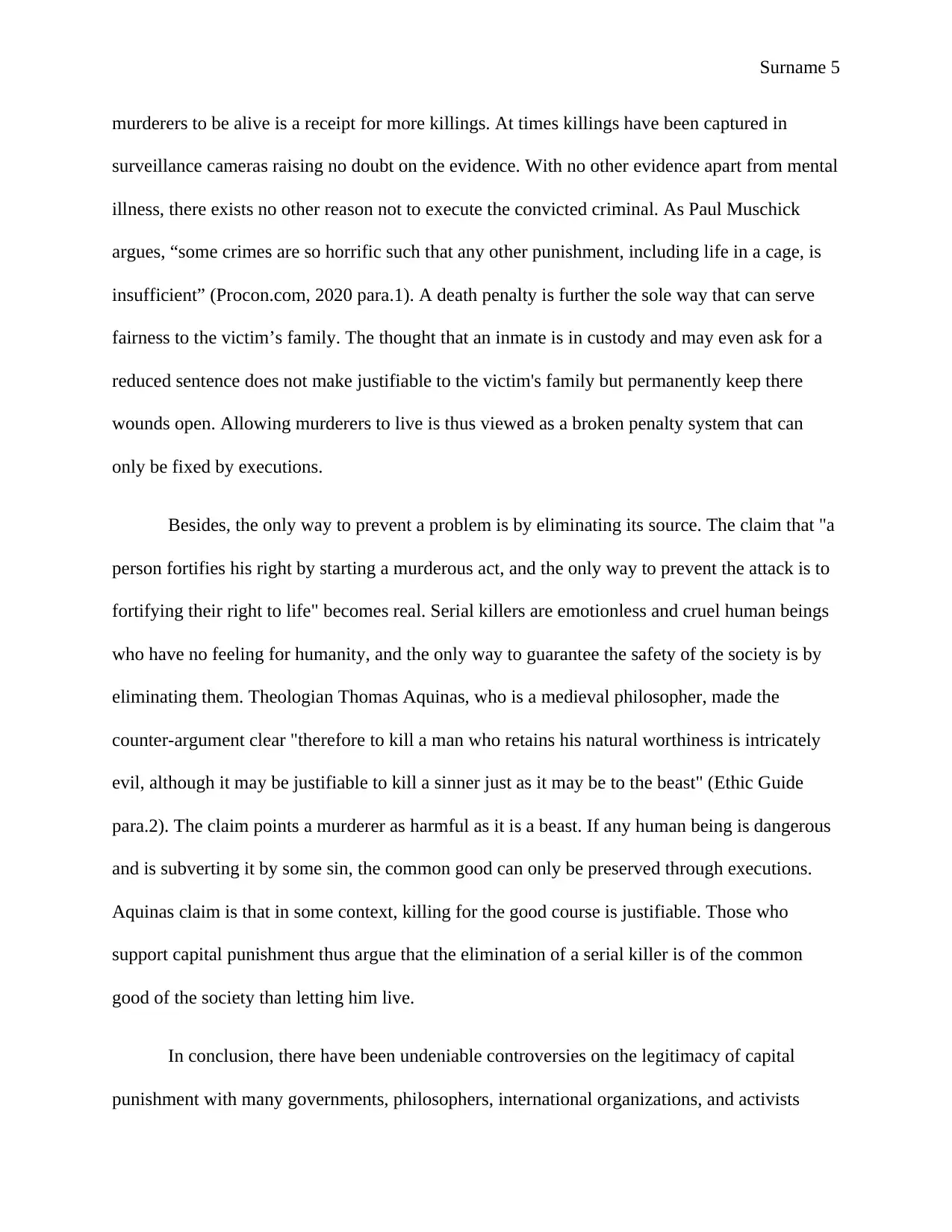
Surname 5
murderers to be alive is a receipt for more killings. At times killings have been captured in
surveillance cameras raising no doubt on the evidence. With no other evidence apart from mental
illness, there exists no other reason not to execute the convicted criminal. As Paul Muschick
argues, “some crimes are so horrific such that any other punishment, including life in a cage, is
insufficient” (Procon.com, 2020 para.1). A death penalty is further the sole way that can serve
fairness to the victim’s family. The thought that an inmate is in custody and may even ask for a
reduced sentence does not make justifiable to the victim's family but permanently keep there
wounds open. Allowing murderers to live is thus viewed as a broken penalty system that can
only be fixed by executions.
Besides, the only way to prevent a problem is by eliminating its source. The claim that "a
person fortifies his right by starting a murderous act, and the only way to prevent the attack is to
fortifying their right to life" becomes real. Serial killers are emotionless and cruel human beings
who have no feeling for humanity, and the only way to guarantee the safety of the society is by
eliminating them. Theologian Thomas Aquinas, who is a medieval philosopher, made the
counter-argument clear "therefore to kill a man who retains his natural worthiness is intricately
evil, although it may be justifiable to kill a sinner just as it may be to the beast" (Ethic Guide
para.2). The claim points a murderer as harmful as it is a beast. If any human being is dangerous
and is subverting it by some sin, the common good can only be preserved through executions.
Aquinas claim is that in some context, killing for the good course is justifiable. Those who
support capital punishment thus argue that the elimination of a serial killer is of the common
good of the society than letting him live.
In conclusion, there have been undeniable controversies on the legitimacy of capital
punishment with many governments, philosophers, international organizations, and activists
murderers to be alive is a receipt for more killings. At times killings have been captured in
surveillance cameras raising no doubt on the evidence. With no other evidence apart from mental
illness, there exists no other reason not to execute the convicted criminal. As Paul Muschick
argues, “some crimes are so horrific such that any other punishment, including life in a cage, is
insufficient” (Procon.com, 2020 para.1). A death penalty is further the sole way that can serve
fairness to the victim’s family. The thought that an inmate is in custody and may even ask for a
reduced sentence does not make justifiable to the victim's family but permanently keep there
wounds open. Allowing murderers to live is thus viewed as a broken penalty system that can
only be fixed by executions.
Besides, the only way to prevent a problem is by eliminating its source. The claim that "a
person fortifies his right by starting a murderous act, and the only way to prevent the attack is to
fortifying their right to life" becomes real. Serial killers are emotionless and cruel human beings
who have no feeling for humanity, and the only way to guarantee the safety of the society is by
eliminating them. Theologian Thomas Aquinas, who is a medieval philosopher, made the
counter-argument clear "therefore to kill a man who retains his natural worthiness is intricately
evil, although it may be justifiable to kill a sinner just as it may be to the beast" (Ethic Guide
para.2). The claim points a murderer as harmful as it is a beast. If any human being is dangerous
and is subverting it by some sin, the common good can only be preserved through executions.
Aquinas claim is that in some context, killing for the good course is justifiable. Those who
support capital punishment thus argue that the elimination of a serial killer is of the common
good of the society than letting him live.
In conclusion, there have been undeniable controversies on the legitimacy of capital
punishment with many governments, philosophers, international organizations, and activists
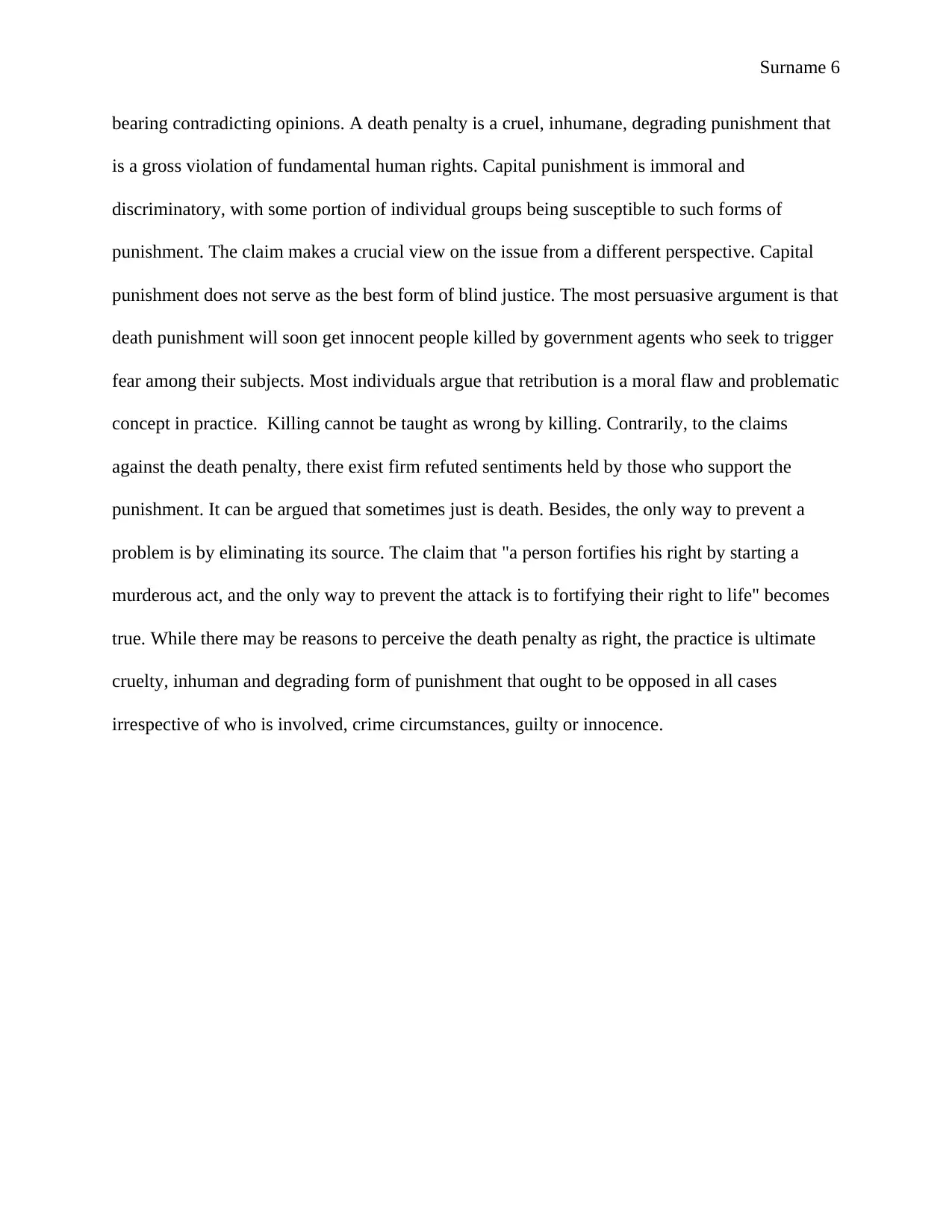
Surname 6
bearing contradicting opinions. A death penalty is a cruel, inhumane, degrading punishment that
is a gross violation of fundamental human rights. Capital punishment is immoral and
discriminatory, with some portion of individual groups being susceptible to such forms of
punishment. The claim makes a crucial view on the issue from a different perspective. Capital
punishment does not serve as the best form of blind justice. The most persuasive argument is that
death punishment will soon get innocent people killed by government agents who seek to trigger
fear among their subjects. Most individuals argue that retribution is a moral flaw and problematic
concept in practice. Killing cannot be taught as wrong by killing. Contrarily, to the claims
against the death penalty, there exist firm refuted sentiments held by those who support the
punishment. It can be argued that sometimes just is death. Besides, the only way to prevent a
problem is by eliminating its source. The claim that "a person fortifies his right by starting a
murderous act, and the only way to prevent the attack is to fortifying their right to life" becomes
true. While there may be reasons to perceive the death penalty as right, the practice is ultimate
cruelty, inhuman and degrading form of punishment that ought to be opposed in all cases
irrespective of who is involved, crime circumstances, guilty or innocence.
bearing contradicting opinions. A death penalty is a cruel, inhumane, degrading punishment that
is a gross violation of fundamental human rights. Capital punishment is immoral and
discriminatory, with some portion of individual groups being susceptible to such forms of
punishment. The claim makes a crucial view on the issue from a different perspective. Capital
punishment does not serve as the best form of blind justice. The most persuasive argument is that
death punishment will soon get innocent people killed by government agents who seek to trigger
fear among their subjects. Most individuals argue that retribution is a moral flaw and problematic
concept in practice. Killing cannot be taught as wrong by killing. Contrarily, to the claims
against the death penalty, there exist firm refuted sentiments held by those who support the
punishment. It can be argued that sometimes just is death. Besides, the only way to prevent a
problem is by eliminating its source. The claim that "a person fortifies his right by starting a
murderous act, and the only way to prevent the attack is to fortifying their right to life" becomes
true. While there may be reasons to perceive the death penalty as right, the practice is ultimate
cruelty, inhuman and degrading form of punishment that ought to be opposed in all cases
irrespective of who is involved, crime circumstances, guilty or innocence.
⊘ This is a preview!⊘
Do you want full access?
Subscribe today to unlock all pages.

Trusted by 1+ million students worldwide
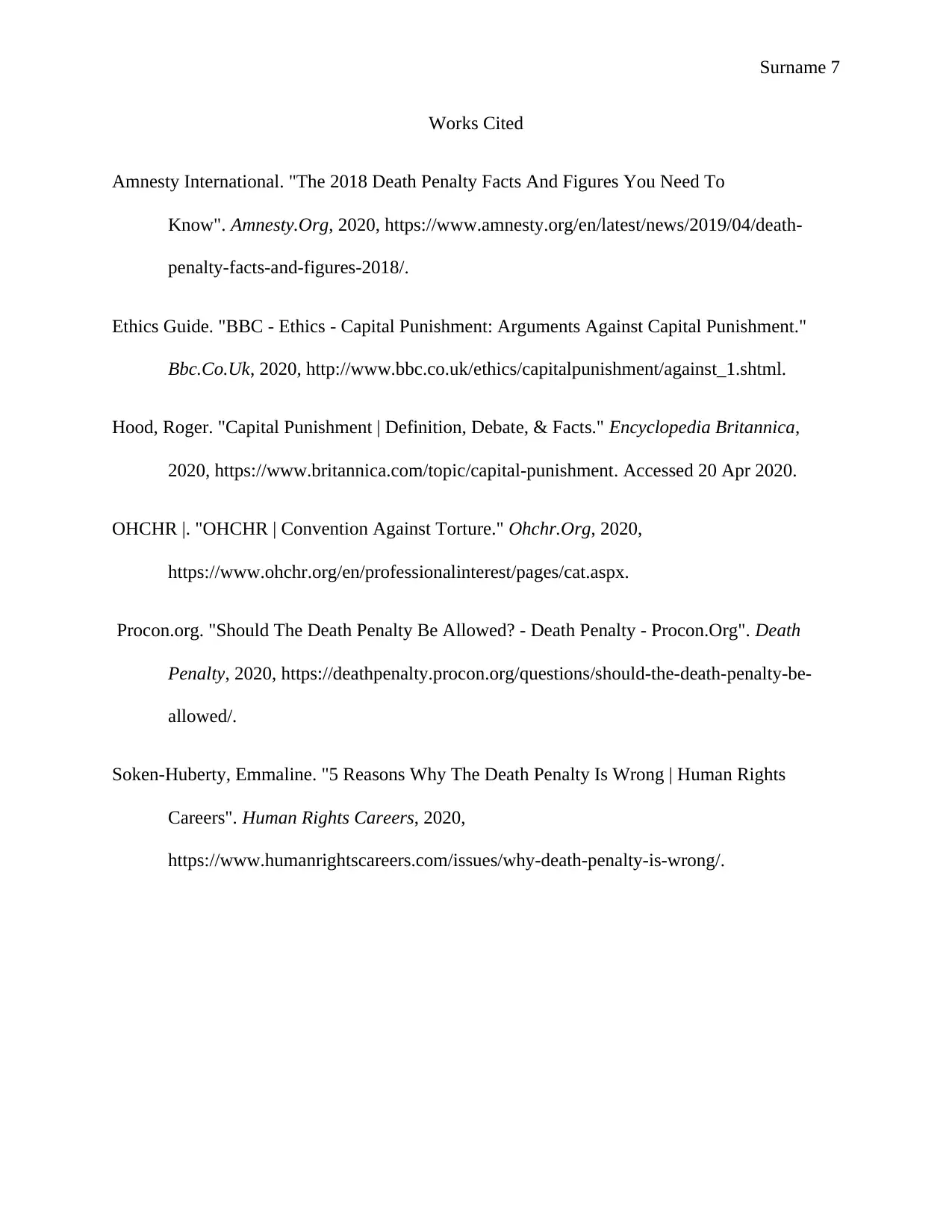
Surname 7
Works Cited
Amnesty International. "The 2018 Death Penalty Facts And Figures You Need To
Know". Amnesty.Org, 2020, https://www.amnesty.org/en/latest/news/2019/04/death-
penalty-facts-and-figures-2018/.
Ethics Guide. "BBC - Ethics - Capital Punishment: Arguments Against Capital Punishment."
Bbc.Co.Uk, 2020, http://www.bbc.co.uk/ethics/capitalpunishment/against_1.shtml.
Hood, Roger. "Capital Punishment | Definition, Debate, & Facts." Encyclopedia Britannica,
2020, https://www.britannica.com/topic/capital-punishment. Accessed 20 Apr 2020.
OHCHR |. "OHCHR | Convention Against Torture." Ohchr.Org, 2020,
https://www.ohchr.org/en/professionalinterest/pages/cat.aspx.
Procon.org. "Should The Death Penalty Be Allowed? - Death Penalty - Procon.Org". Death
Penalty, 2020, https://deathpenalty.procon.org/questions/should-the-death-penalty-be-
allowed/.
Soken-Huberty, Emmaline. "5 Reasons Why The Death Penalty Is Wrong | Human Rights
Careers". Human Rights Careers, 2020,
https://www.humanrightscareers.com/issues/why-death-penalty-is-wrong/.
Works Cited
Amnesty International. "The 2018 Death Penalty Facts And Figures You Need To
Know". Amnesty.Org, 2020, https://www.amnesty.org/en/latest/news/2019/04/death-
penalty-facts-and-figures-2018/.
Ethics Guide. "BBC - Ethics - Capital Punishment: Arguments Against Capital Punishment."
Bbc.Co.Uk, 2020, http://www.bbc.co.uk/ethics/capitalpunishment/against_1.shtml.
Hood, Roger. "Capital Punishment | Definition, Debate, & Facts." Encyclopedia Britannica,
2020, https://www.britannica.com/topic/capital-punishment. Accessed 20 Apr 2020.
OHCHR |. "OHCHR | Convention Against Torture." Ohchr.Org, 2020,
https://www.ohchr.org/en/professionalinterest/pages/cat.aspx.
Procon.org. "Should The Death Penalty Be Allowed? - Death Penalty - Procon.Org". Death
Penalty, 2020, https://deathpenalty.procon.org/questions/should-the-death-penalty-be-
allowed/.
Soken-Huberty, Emmaline. "5 Reasons Why The Death Penalty Is Wrong | Human Rights
Careers". Human Rights Careers, 2020,
https://www.humanrightscareers.com/issues/why-death-penalty-is-wrong/.
1 out of 7
Related Documents
Your All-in-One AI-Powered Toolkit for Academic Success.
+13062052269
info@desklib.com
Available 24*7 on WhatsApp / Email
![[object Object]](/_next/static/media/star-bottom.7253800d.svg)
Unlock your academic potential
Copyright © 2020–2026 A2Z Services. All Rights Reserved. Developed and managed by ZUCOL.




